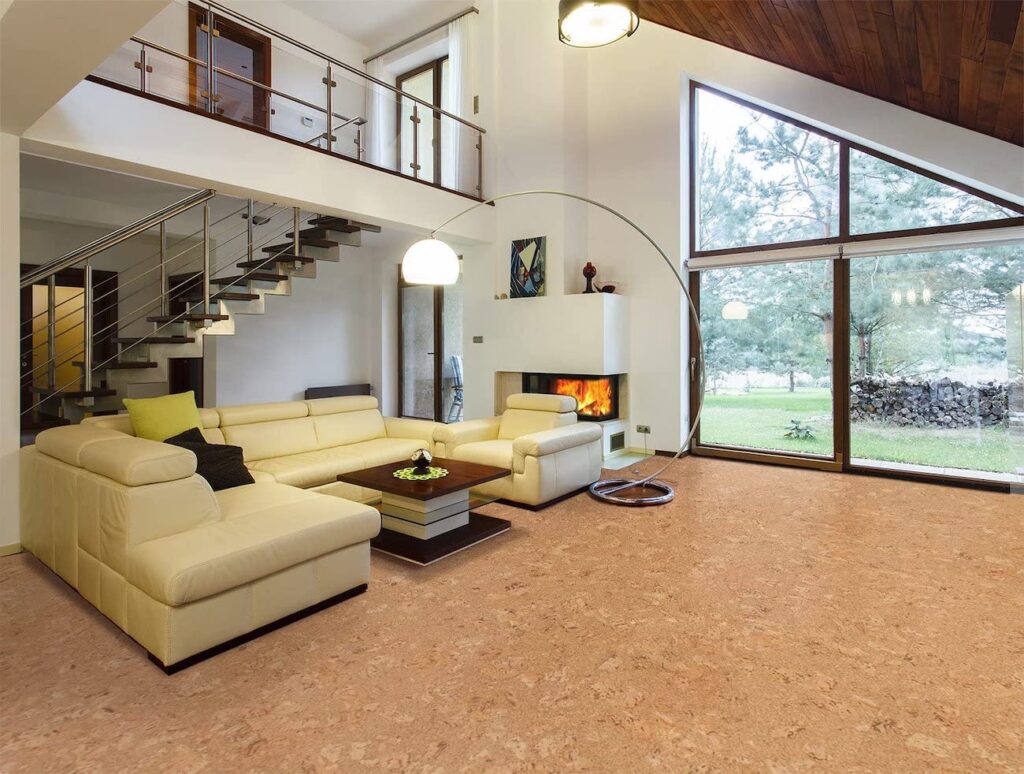You need to deal with cork flooring options in basement if you are thinking about remodeling the room – or even doing a major renovation work. Basement is one of the toughest rooms to control. It is usually dingy, cold, and dark – and it usually holds up a lot of moisture-related issues.
Even hardwood materials, like oak or maple, may not be easily installed in the room. But there is no need to worry as you can consider many options for your basement flooring needs.
Why Cork Flooring?
Innovations are always made in home improvement business, including in flooring section. Flooring is one of the most crucial and most important factors in any home improvement tasks or projects. It’s the foundation of your house – the place where you stand and move your feet.
It would be impossible to have a house without a floor, right?
However, the matter of flooring isn’t an easy one – it’s always complicated. Some people choose the hardwood floor with its absolutely beautiful finish, solid quality, and gorgeous aesthetic appeal. And yet, such a hardwood floor is super pricey.
If you go with the cheaper option (such as laminate floor), the quality may not be as good as the hardwood type. Sure, you may like the lower price tag but we are talking about quality – and inexpensive stuff generally lacks of it.
But then again, hardwood floor isn’t eco-friendly despite of its beautiful and long-lasting finish. If you are an environmentally conscious individual, then you may cross hardwood floor from the list.
Cork flooring is more environmentally-friendly. It is harvested through a safe procedure that doesn’t harm the tree at all, and it is also biodegradable – meaning that it will break down after the life cycle has ended. For those who are into environment, this type of flooring would be the ideal pick.
So, if you are thinking of having cork floor for the basement, what is the cork flooring options in basement solution to have?
Read Also: Globus Cork Flooring Review and Every Homeowner’s Expectation
Basement Flooring: The Problem
Basement is a complicated room because of the location. It is often damp and humid – wet walls are quite common too. The room generally ‘traps’ moisture which can be bad for any home improvement work, unless you can do something about the room and introduce better air flow.
Finding the perfect flooring for the basement can be a challenge; thus, dealing with the installation. Wet walls, flooding, and moisture bleeding are quite common. Even concrete (floor) slabs are able to bleed moisture which may migrate up – and go through the slab.
Don’t be fooled by the dry slab appearance. The bare slab looks dry but it holds moisture within the surface.
The reason why you should seriously consider cork flooring options in basement is because of the complex matter. Not only the slab can bleed moisture, but the moisture also changes following the weather. You may find your basement dry during summers, but it is humid again in falls and winters.
If you are thinking about using materials that aren’t water resistant (such as stone or ceramic tile), then you should include moisture barrier. Apply the moisture barrier first and then followed by the water resistant flooring materials.
It’s a good thing that cork has a natural water-resistant property. The reason why cork has been used to plug wine bottles for so many years is because of the water-resistant trait. Cork won’t absorb water although it isn’t waterproof. Moisture always finds its way around.
On cork, it may seep into the inner part, causing damages from within. That’s why it is advisable that you still use moisture barrier if you want to install cork at home.
For the standard use, you can consider polyethylene sheets (the six mil type). This is considered another common alternative in cork flooring options in basement installation.
The Installation Options
For cork flooring options in basement, you need to decide about the type of floor to pick and the methods of installation. Home installers recommend using cork floating floor with click-to-click (or most commonly known as click-together) tiles or planks.
This type is generally the engineered piece consisting of different layers. Just like the laminate floor, the cork floating floor consists of cork material (in 3mm thickness) sandwiched in between (waterproof surface) wear layer and fiberboard backing.
To function properly, you should apply moisture barrier first, followed by the underlayment (which must be approved and suggested by flooring manufacturer), and then finalized by the cork flooring.
It is crucial to have the underlayment because this foam layers are responsible for the nice cushion-y feel and they also protect the floor from the moisture (existing underneath it).
Why the glue-down installation is not considered ideal for the basement?
Well, this method requires direct glue down application to the concrete floor – without using any moisture barrier.
The floor is left open and bare – being vulnerable to any condition or attack. If you insist on using the glue-down application, then apply the moisture barrier first, followed by the plywood subfloor, and then the cork flooring. The cork is glued directly to the (plywood) subfloor.
Feel free to choose whatever types of floor that you like. However, most homeowners mostly prefer the floating type because of its easiness and installation. Not to mention that floating floor is relatively easier to replace in case there is damage.
It doesn’t hurt to have a sump pump or drain system if your basement is prone to flooding – it would make it easy to remove the excess water. Make sure to regularly check the perimeter and the ground outside the house – make sure that it slopes away from the house.
Cork Flooring Preparation for the Basement
If you are interested in the installation, then you won’t get the information here. We’re going to talk about several tips and different cork flooring options in basement before the installation. There are several precautions that you need to address before the installation project.
- Always, always, and always do the moisture test to check humidity level
You should do the test periodically (within a few days) so you can learn about the levels. Also perform the check during bad weather and storm.
If the humidity level is more than 60%, then cork flooring may not be the best option for the basement because the floor would contract and expand. When it happens, you will definitely have problems with the planks or tiles – as they may pop up or curl from time to time.
However, if the level isn’t 60%, then you have nothing to worry about. You can always install the floor without any problem.
- Always make sure that the basement remains dry
Use the dehumidifier to reduce the moisture. Check the concrete slab before the installation. It should be smooth and it shouldn’t have any crack so moisture can’t seep into the slab.
- Don’t go overboard and dismiss the flooring warranty – always follow it
It would be wise to check the (manufacturer’s) directions and recommendation when you want to install material within the below grade environment.
Don’t buy anything before checking or understanding the products – along with the warranty.
Not all cork products have the same features and benefits – different manufacturers have different methods that will result in different outcomes. Some suppliers may not advise the installation within certain locations or environments, while others may say okay.
If the supplier says that you can’t install the product in the basement, then don’t do it. If you insist on doing it, then you will likely void the product’s warranty.
Bamboo vs Cork
A lot of homeowners would be thinking about having either cork or bamboo flooring. Bamboo is another eco-friendly material that doesn’t hurt the environment during the manufacturing process.
Not to mention that bamboo is pretty resistant against moisture and humidity. Many homeowners choosing bamboo claim that their bamboo floor for the basement turns out to be perfect. The basement turns out great and they don’t experience any damage to the floor.
Bamboo as another alternative cork flooring options in basementturns out to be quite a good option. Just like cork, bamboo has its own water-resistant quality that is even more superior than hardwood floor.
That’s why homeowners often turn to either bamboo or cork for their below grade flooring option. Just like cork, you can glue down bamboo to the (concrete) subfloor.
But remember to do moisture test before doing any installation. If the test shows that the basement has a high humidity level and too much moisture, then you need to figure out other options.
Read Also: Everything About NovaFloor Cork Review, Maintenance And Cost
Final Words
Cork flooring may not be designed for basement or below grade setting. But then again, there are always alternative methods, solutions, and tips to make this floor work for the location and the setting.
The floor itself has its own natural characteristics that may benefit the homeowners, but still, it’s not for everyone. With cork flooring options in basement, you should have different kinds of choices to improve your basement’s appearance and also value.





